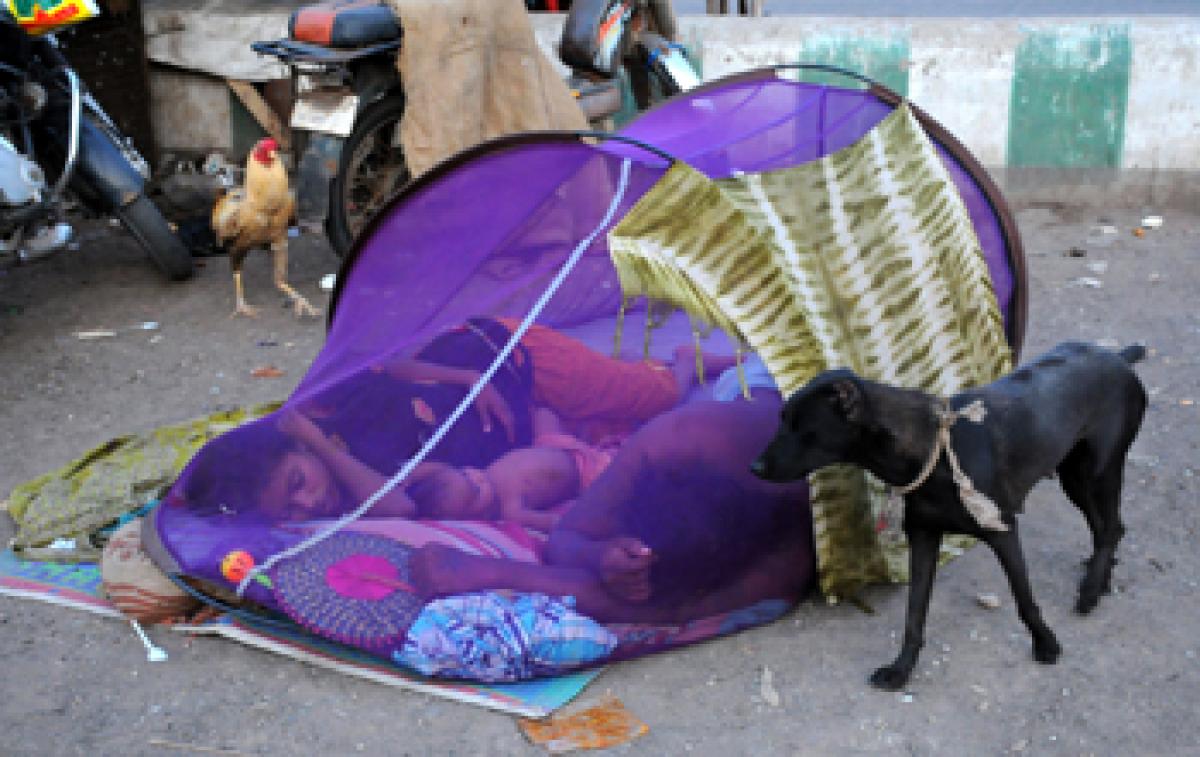Protectors of matriarchal system

Nakkalollu, are the members of Nakkala Scheduled Tribe, who are mostly visible in South India. They sell beads, combs and small utensils in market areas of many towns in Andhra Pradesh, Telangana, Tamil Nadu and Karnataka.
Nakkalollu Tribe
Ongole: Nakkalollu, are the members of Nakkala Scheduled Tribe, who are mostly visible in South India. They sell beads, combs and small utensils in market areas of many towns in Andhra Pradesh, Telangana, Tamil Nadu and Karnataka. They used to be wanderers once, though most of them settled in towns they do not have a permanent shelter even now. But, they carry on their traditions unique from others in surroundings, protect their matriarchal culture and offer Kanyasulkam for their sons to get married.
Nakkalollu can be easily identified as they chew tobacco with betel leaves, men have hairy buns on their heads while women wear dress just below their knees with naked children in their arms. The people often complain that they smell bad and the children are not welcome in schools and even shops. Nakkalollu used to live on hunting squirrels, cats, birds but are now petty vendors selling beads, mirrors, combs and small utility items made of plastic and steel. They need hardly a 40 square feet place for their business and family needs. They live life on their own terms and do not seek anything from the government.
In Andhra Pradesh, Nakkalollu are spread across coastal districts including Chittoor, Nellore, Prakasam, Guntur, Godavari and Visakhapatnam. In Prakasam district, they have been in Ongole, Chirala, Yerragondapalem, Pullalacheruvu, Markapur and Giddalur surroundings for a long time and have more than a thousand population in each area. Nakkalollu are illiterate. They do not know what the government is spending in their name and they do not question who the real beneficiaries are and how much those people benefit from the schemes.
Jamla Kamala, a woman from the tribe said, “We too are human beings, and have emotions. We are used to this life style for years, but we don’t want our lives to end like this. We don’t want the children run for cover from sun and rain. We too want our children go to school, get educated and get a job for decent living. But, to enter o school, the children must bath and get rid of bad smell. To bath and clean our cloths, we need a water source. In this town, no one allows us near to a public water tap at least to clean ourselves. Give us the opportunity and then complain about us.”
As they are not going to school, the Nakkala girls go to the streets for begging. The boys help mothers in opening the shops and run the business. The men help the women in shops or work individually to earn a few bucks. Most of the men in the Nakkala families are addicted to alcohol, but they should handover the remaining money to the wife and mother when they reach home.
Pavar Balu, who is about to get married in a couple of months said, “We respect the women in the family and they are the decision makers most of the times. Their decision is final in marriages, setting up shops, and running families. Men are free to take decisions in the areas where the women do not have sufficient knowledge.”
Nakkalollu are said to be natives of the region between Tamil Nadu and Kerala. Wherever they are now, they still go to Tamil Nadu to participate in various festivals, for treatment in hospitals and to make relations with other families there. Jamla Sobhan Babu explains the family traditions as, “We have about eight surnames and people with each surname have a head. Each surname people have relation with people with other surnames and mostly we call them by the relation.
If there are any disputes between the people of the tribe, they would be discussed between the heads of those surnames and settled on by mutual consent. Once accepted, the decision is final and everyone in their family should abide by it. When one of the boys in the family is ready to be married, the mother of the boy goes to the girl’s house and asks the parent’s permission. Nowadays the girl’s parents are demanding about Rs 1 lakh dowry beside the expenses for the marriage ceremony.
It is the responsibility of the boy to earn and pay the money to his in-laws or loan the amount and clear it in installments. The duration to earn the dowry amount indicates the earning capacity of the boy. If they agree, auspicious time for the marriage would be set by a yadava priest. Then as in the Muslim tradition, the mother of the boy ties a black bead necklace to the girl in the evening and the boy ties another necklace of the same in the morning.
The night during the marriage is celebrated with alcohol, but not at the houses of the bride or groom. The bridegroom family distributes 1kg rice, one chicken and sufficient liquor and beer bottles to all the nearby relatives. They cook the food and enjoy the alcohol at their own place but wish the new couple in the morning.”
Nakkalollu pray to mother goddess. In Andhra Pradesh, they pray to Goddess Durga, who is said to be the sister of their family goddess Mudurai Meenakshi. They visit both shrines at least once a year with the family and make a get together with the family members left at their native place. In the world, where the girl child has no security even in the womb, the girl child of Nakkalollu gets the power to lead the house and respect in their society. The girl in Nakkala family is like Sivagami in Bahubali. Her word is Law!
By Naresh Nandam








